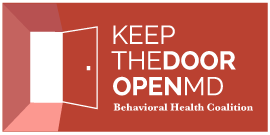Coalition’s priorities would expand access to high quality behavioral health treatment through system reform, parity legislation, budget commitments, student support and crisis response
(Available for download here)
Annapolis, Md. (January 8, 2020) – As Maryland’s legislative session begins, the Maryland Behavioral Health Coalition pledged to work together toward their 2020 legislative agenda, which includes four priorities to ensure every Marylander has access to mental health and substance use disorder treatment when and where needed. The coalition’s work comes at a time when even Marylanders with insurance struggle to access quality behavioral health services in the midst of an opioid epidemic and soaring suicide rates.
“We’ve got to keep our foot on the pedal when it comes to behavioral health,” said Dan Martin, senior director of public policy for the Mental Health Association of Maryland. “Maryland has made some big strides in recent years to address longstanding and pervasive barriers to treatment for children and adults with mental health and substance use disorders – but there is still so much work to be done.”
The legislative agenda embraced by the coalition of more than 50 nonprofit organizations includes:
- Improve access to and coordination of quality community behavioral health services. A recent nationwide study by Milliman Inc. found that Maryland is among the worst states for access to affordable in-network mental health and substance use treatment. Marylanders are 10 times more likely to go out-of-network for behavioral health care compared to primary care, a rate that is fourth worst in the nation. The state should adopt the Behavioral Health Coalition’s platform to modernize Maryland’s public behavioral health system and enact legislative policies to ensure the appropriate enforcement of federal and state parity laws.
- Fully fund prior budget commitments in FY 2021 to prevent a reduction in access to community mental health and substance use disorder services. Long-overdue multi-year behavioral health provider rate increases were included in the HOPE Act of 2017 and minimum wage legislation in 2019. In 2018, the legislature enacted multi-year funding initiatives to expand crisis response services and improve the delivery of behavioral health care in primary care settings.
- Adopt and ensure adequate funding for a comprehensive set of strategies included in the Kirwan Commission’s report for enhancing school-based behavioral health services. These strategies have been shown to improve student health and educational outcomes.
- Develop a statewide comprehensive crisis response system and increase the availability of harm reduction interventions. An inability to access quality mental health and substance use disorder services is forcing more Marylanders into costly emergency departments or discouraging them from seeking care at all. This crisis in access is tied to an exponential increase in the number of Marylanders lost to suicide, unintentional overdose and other preventable deaths.
Delegate Sheree Sample-Hughes will introduce Behavioral Health Coalition priority legislation aimed at addressing inadequate commercial health insurer behavioral health provider networks. “It’s unfair – and unacceptable – that in a state like Maryland, people with health insurance coverage are still finding it increasingly difficult to access mental health and addiction services,” said Sample-Hughes. “This unequal treatment has to stop.”
Overdose deaths increased in 2018 for the eighth year in a row, reaching an all-time high of 2,406. And while these deaths decreased slightly during the first six months of 2019, 1,182 Marylanders still lost their lives to overdose during that time. Maryland suicides have increased dramatically since 1999, and demand for mental health and substance use treatment has risen steadily since 2008, with over 300,000 Maryland children and adults currently using and depending on the state’s public behavioral health system.
More than 1 in 5 Marylanders will experience a mental health or substance use disorder in any given year.
The Behavioral Health Coalition will hold a rally in Annapolis to advocate for these priorities on Feb. 27 at 12 p.m.
Contacts: Dawn Stoltzfus, dawn@thehatchergroup.com, The Hatcher Group, 410-267-4153 Dan Martin, dmartin@mhamd.org, Mental Health Association of Maryland, 410-978-8865
The Behavioral Health Coalition of Maryland is a diverse mix of more than 50 nonprofit organizations working together to ensure individuals affected by mental health and substance use disorders have high quality and accessible services for their needs. www.keepthedooropenmd.org
